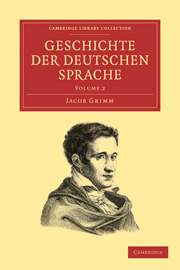Book contents
- Frontmatter
- XXI HESSEN UND BATAVEN
- XXII HERMUNDUREN
- XXIII DIE NIEDERDEUTSCHEN
- XXIV FRIESEN UND CHAUKEN
- XXV LANGOBARDEN UND BURGUNDEN
- XXVI DIE UBRIGEN OSTSTÄMME
- XXVII SCANDINAVIEN
- XXVIII DIE EDDA
- XXIX GERMANEN UND DEUTSCHE
- XXX RÜCKBLICK
- XXXI DEUTSCHE DIALECTE
- XXXII DER ABLAUT
- XXXIII DIE REDUPLICATION
- XXXIV SCHWACHE VERBA
- XXXV VERSCHOBNES PRAETERITUM
- XXXVI DIE VOCALE DER DECLINATION
- XXXVII DER INSTRUMENTALIS
- XXXVIII SCHWACHE NOMINA
- XXXIX DER DUALIS
- XL RECHT UND LINK
- XLI MILCH UND FLEISCH
- XLII SCHLUSS
- Bemerkte druckfehler, lies
- Frontmatter
- XXI HESSEN UND BATAVEN
- XXII HERMUNDUREN
- XXIII DIE NIEDERDEUTSCHEN
- XXIV FRIESEN UND CHAUKEN
- XXV LANGOBARDEN UND BURGUNDEN
- XXVI DIE UBRIGEN OSTSTÄMME
- XXVII SCANDINAVIEN
- XXVIII DIE EDDA
- XXIX GERMANEN UND DEUTSCHE
- XXX RÜCKBLICK
- XXXI DEUTSCHE DIALECTE
- XXXII DER ABLAUT
- XXXIII DIE REDUPLICATION
- XXXIV SCHWACHE VERBA
- XXXV VERSCHOBNES PRAETERITUM
- XXXVI DIE VOCALE DER DECLINATION
- XXXVII DER INSTRUMENTALIS
- XXXVIII SCHWACHE NOMINA
- XXXIX DER DUALIS
- XL RECHT UND LINK
- XLI MILCH UND FLEISCH
- XLII SCHLUSS
- Bemerkte druckfehler, lies
Summary
Aller Germanen vierten oder mittleren hauptstamm nennt Plinius den herminonischen: mediterranei Herminones, quorum Suevi, Hermunduri, Chatti, Cherusci; wie den Römern, wenn sie von süden nach norden schauten, in der mitte Germaniens diese vier völker aufstossen musten. hierzu stimmt auch des Tacitus angabe, welcher die mittleren Germanen von des Mannus zweitem sohne stammen lässt, dessen name Hermin aus dem der Herminonen gefolgert werden darf. welche einzelnen völker aber zu diesen Herminonen gehörten berichtet Tacitus nicht. Dass zwischen Sueven und Chatten engeres band stattfand suchte das vorhergehende capitel nachzuweisen; wenn aus fehden und eifersucht benachbarter stämme ein schluss gilt gegen ihre nähere verwandtschaft, so mag man zweifeln, ob Chatten mit Cherusken und Hermunduren zusammen gehören. Auf den herminonischen namen, wie ihr eigner zeigt, haben Hermunduren den unmittelbarsten anspruch.
Es ist bekannt, dass jenem lat. Hermin oder Hermun die ahd. form Irmin oder Erman, die ags. Eormen, altn. Iörmun entspreche, den Gothen lautete sie wol Airman; wie noch heute romanische völker thun, pflegten die Römer deutsches H, wo es wirklich bestand, zu unterdrücken, hingegen zuzufügen, wo das deutsche wort rein vocalisch anlautet. das H in Herminones Hermunduri weicht also durchaus ab von dem CH in Chatti Cherusci, welches dem lat. C und ahd. H entspricht, und niemals könnte Cherminones Chermunduri geschrieben werden. im mannsnamen Arminius wahrten die Römer reinen deutschen vocal.
- Type
- Chapter
- Information
- Geschichte der deutschen Sprache , pp. 596 - 607Publisher: Cambridge University PressPrint publication year: 2009First published in: 1848



